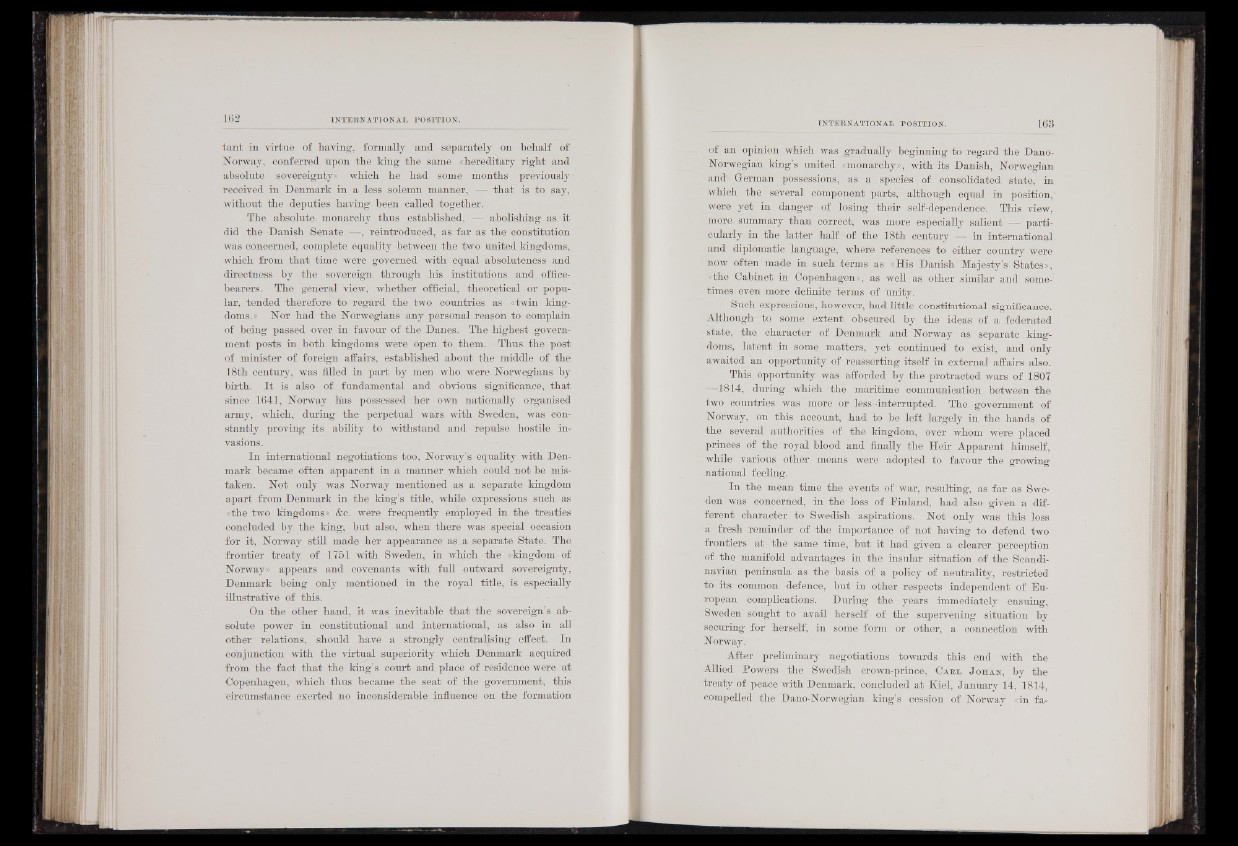
taut in virtue of having, formally and separately on behalf of
Norway, conferred npon the king the same «hereditary right and
absolute sovereignty» which he had some months previously
received in Denmark in a less solemn m a n n e r , t h a t is to say,
without the deputies having been called together.
The absolute, monarchy thus established, S 9 abolishing as it
did the Danish Senate —, reintroduced, as far as the constitution
was concerned, complete equality between the two united kingdoms,
which from, that time were governed with equal absoluteness and
directness by the sovereign through his institutions and officebearers.
The general view, whether official, theoretical or popular,
tended therefore to regard the two countries as «twin kingdoms.
» Nor had the Norwegians any personal reason to complain
of being passed over in favour of the Danes. The highest government
posts in both kingdoms were open to them. Thus the post
of minister of foreign affairs, established about the middle of the
18th century, was filled in part by men who were Norwegians by
birth. I t is also of fundamental and obvious significance, that
since 1641, Norway has possessed her own nationally organised
army, which, during the perpetual wars with Sweden, was constantly
proving its ability to withstand and repulse hostile invasions.
In international negotiations too, Norway’s'equality with Denmark
became often apparent in a manner which could not be mistaken.
Not only was Norway mentioned as a separate kingdom
apart from Denmark in the king’s title, while expressions such as
«the two kingdoms» &c. were frequently employed in the treaties
concluded by the king, but also, when there was special occasion
for it, Norway still made her appearance as a separate State. The
frontier treaty of 1751 with Sweden, in which the «kingdom of
Norway» appears and covenants with full outward sovereignly,
Denmark being only mentioned in the royal title, is . especially
illustrative of this.
On the other hand, it was inevitable that the sovereign’s absolute
power in constitutional and international, as also in all
other relations, should have a strongly centralising effect. In
conjunction with the virtual superiority which Denmark acquired
from the fact that the king’s court and place of residence were at
Copenhagen, which thus became the seat of the government, this
circumstance exerted no inconsiderable influence on the formation
of an opinion which was gradually beginning to regard the Dano-
Norwegian king’s united «monarchy», with its Danish, Norwegian
and German possessions, as a species of consolidated state, in
which the several component parts, although equal in position,
were yet in danger of losing their self-dependence. This view,
more- summary than correct, was more especially salient -4- particularly
in the latter half of the 18th century — in international
and diplomatic language, where references to either country were
now often made in such terms as «His Danish Majesty’s States»,
«the Cabinet in Copenhagen», as well as other similar and some-'
times even more definite terms of unity.
Such expressions, however, had little constitutional significance.
Although- to some extent obscured by the ideas of a federated
state, the character of Denmark and Norway as separate kingdoms,
latent in some matters, yet continued to exist, and only
awaited an opportunity of reasserting itself in external affairs also.
This opportunity was afforded by the protracted wars of 1807
E—1814, during which the maritime communication between the
two countries was more or less interrupted. The government of
Norway, on this account, had to be left largely in the hands of
the several authorities of the kingdom, over whom were placed
princes of the royal blood and finally the Heir Apparent himself,
while various other means were adopted to favour the growing
national feeling.
In the mean time the events of war, resulting, as far as Sweden
was concerned, in the loss of Finland, had also given a different
character to Swedish aspirations. Not only was this loss
a fresh reminder of the importance of not having to defend two
frontiers at the same time, but it had given a clearer perception
of the manifold advantages in the insular situation of the Scandinavian
peninsula as the basis of a policy of neutrality, restricted
to its common defence, but in other respects independent of European
complications. During the years immediately ensuing,
Sweden sought to avail herself of the supervening situation by
securing for herself, in some form or other, a connection with
Norway.: '
After preliminary negotiations towards this end with the
Allied Powers the Swedish crown-prince, Ca r l J o h a n , by the
treaty of peace with Denmark, concluded at Kiel, January 14, 1814,
compelled the Dano-Norwegian king’s cession of Norway «in fa